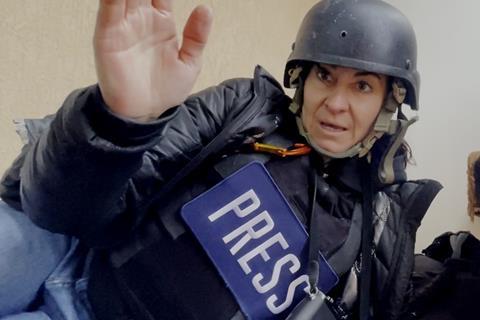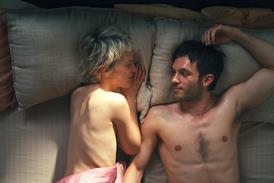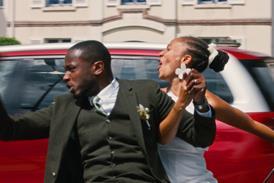Chai Vasarhelyi and Jimmy Chin’s insightful documentary focuses on the balance between ambition and responsibility

Dirs: Chai Vasarhelyi and Jimmy Chin. US/UK. 95mins. 2025
As a Pulitzer Prize-winning war photographer, Lynsey Addario is used to finding herself in the middle of the world’s most dangerous locations – in fact, she positively thrives on it. What this insightful documentary from Oscar-winning filmmakers Chai Vasarhelyi and Jimmy Chin makes clear, however, is that the biggest conflict Addario faces is to be found on home soil: namely the constant battle between her all-consuming job and her role as a wife and mother.
An interesting and personable subject
Vasarhelyi and Chin’s Oscar-winning Free Solo (2018) also focused on the tension between ambition and responsibility as it followed the at-all-costs endeavours of free climber Alex Honnold to scale Yosemite’s El Capitan. The stakes are perhaps even higher in Love + War, as Addario is doing essential work in reporting global atrocities to an international audience.
She certainly makes for an interesting and personable subject and that should help attract audiences when the film, which premiered in Toronto and has played several festivals including London, opens in select US and UK cinemas in late October and moves to streaming on November 7. The filmmakers’ own reputation – the pair have made other documentaries including Return To Space (2022) and Wild Life (2023) as well as Oscar-nominated feature Nyad (2023) – should also be a selling point.
For over 20 years, Lynsey Addario has been traveling to locations including Afghanistan, Iraq, Libya, Lebanon, Syria and Sudan to photograph conflict and humanitarian crises. She has received numerous awards, including two Pulitzers as part of the New York Times teams who won in 2023 for their Ukraine coverage and in 2009 for their Afghanistan/Pakistan reporting. Over the last few years, Addario has spent a great deal of time in Ukraine, documenting the lives of soldiers and ordinary citizens – some of whom she revisits multiple times.
Shooting in colour, Addario’s work is instinctive, intimate and authentic; she is particularly focused on telling women’s stories, which might otherwise go unnoticed, and capturing the human side of these epic events. Vasarhelyi and Chin have chosen well from Addario’s heaving archive: images of Mamma Sessay, an 18-year-old who died in childbirth in Sierra Leone in 2010, or the March 7 2022 New York Times picture of a Ukrainian mother and her children killed by Russian mortar fire are striking, shocking and immediate. Her colleague, Ukrainian photojournalist Andiry Dubchak, is with her at the moment she captures this latter image – and other terrible moments before and after – and, through their interactions, there is always a sense that, no matter how good Addario’s eye for an image, she never loses sight of the human cost behind them.
In between these adrenaline-fuelled assignments, Addario returns home to her husband, former Reuters journalist Paul de Bendern, and young children – and it’s here, in their comfortable, busy London townhouse, that Addario’s story really begins to emerge. Vasarhelyi and Chin’s fly-on-the wall approach, together with snappy editing from Keiko Deguchi and Hypatia Porter, captures the recognizable minutiae of daily life – jubilant homecomings, bedtime stories, homework – but also the candid moments in between in which Addario’s feet get increasingly itchy and she becomes frustrated with the limitations placed upon her.
This battle between domestic expectation and personal ambition is a universal one and, while Addario resists being defined by her gender, she is honest in her feelings about how being a woman has impacted on her career. One photo editor, she says, wouldn’t send her to a warzone because she has children at home. Yet she also speaks earnestly about the benefits it can bring; she has been able to access women-only spaces, can perhaps more easily build trust with her female subjects.
As the film’s title suggests, there is a constant attempt at striking some kind of balance – she feels guilty both when she’s working and when she’s not – but promises slip and priorities are shuffled; while husband Paul understands Addario’s need to work, he is equally as clear about the impact it has on their home life. There are also overwhelming concerns for her safety – Addario was kidnapped along with three other journalists in Libya in 2011, an event she recounts with emotional frankness. (There’s also a heartfelt reference to Addario’s colleague Tim Hetherington, who was killed in Libya in 2011.)
While obviously terrifying, that experience wasn’t enough to stop her returning to numerous front lines; you wonder if anything ever will. Interviews with family, friends and colleagues, including New York Times Magazine photography editor Kathy Ryan, certainly flesh out a portrait of Addario as, if not fearless – she’s too level-headed for that – then unendingly driven and determined. And while her work certainly speaks for itself, it’s fascinating to hear Addario tell her own remarkable story.
Production companies: Little Monster Films, National Geographic Documentary Films
International sales: National Geographic
Producers: Chai Vasarhelyi, Jimmy Chin, Shannon Dill, Anna Barnes
Cinematography: Thorsten Thielow
Additional Ukraine cinematography: Andiry Dubchak
Editing: Keiko Deguchi, Hypatia Porter
Music: Claudia Sarne
























